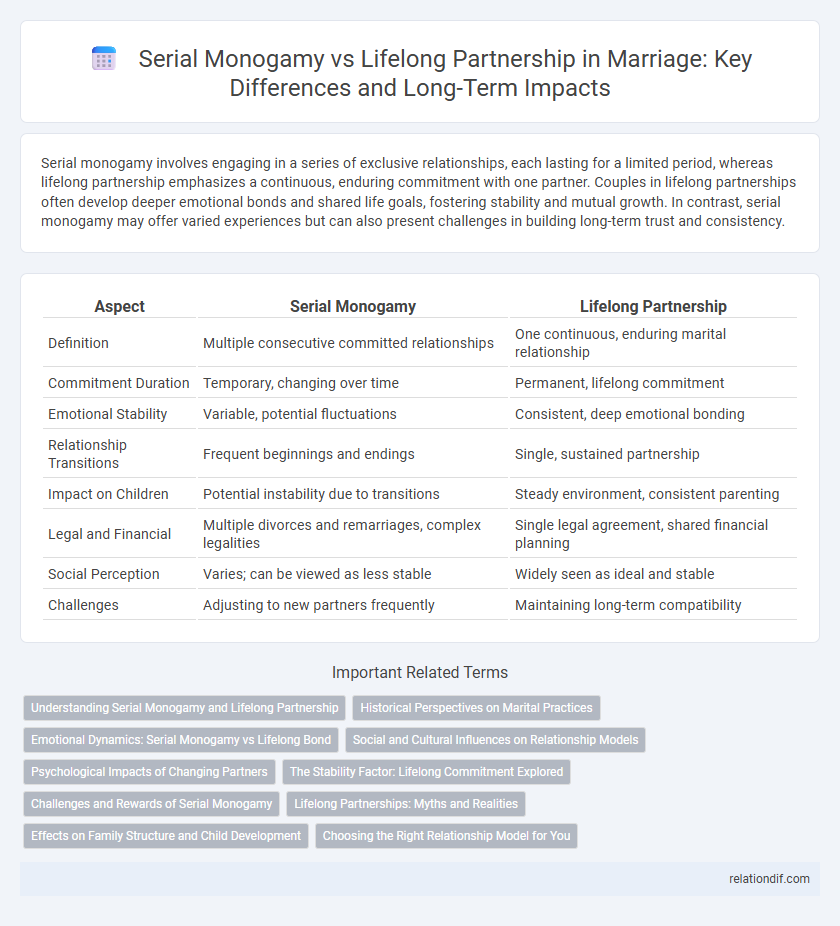Serial monogamy involves engaging in a series of exclusive relationships, each lasting for a limited period, whereas lifelong partnership emphasizes a continuous, enduring commitment with one partner. Couples in lifelong partnerships often develop deeper emotional bonds and shared life goals, fostering stability and mutual growth. In contrast, serial monogamy may offer varied experiences but can also present challenges in building long-term trust and consistency.
Table of Comparison
| Aspect | Serial Monogamy | Lifelong Partnership |
|---|---|---|
| Definition | Multiple consecutive committed relationships | One continuous, enduring marital relationship |
| Commitment Duration | Temporary, changing over time | Permanent, lifelong commitment |
| Emotional Stability | Variable, potential fluctuations | Consistent, deep emotional bonding |
| Relationship Transitions | Frequent beginnings and endings | Single, sustained partnership |
| Impact on Children | Potential instability due to transitions | Steady environment, consistent parenting |
| Legal and Financial | Multiple divorces and remarriages, complex legalities | Single legal agreement, shared financial planning |
| Social Perception | Varies; can be viewed as less stable | Widely seen as ideal and stable |
| Challenges | Adjusting to new partners frequently | Maintaining long-term compatibility |
Understanding Serial Monogamy and Lifelong Partnership
Serial monogamy involves engaging in a series of exclusive, consecutive romantic relationships, reflecting patterns seen in many contemporary societies where individuals seek new partnerships after the dissolution of previous ones. Lifelong partnership emphasizes enduring commitment within a single marriage, often grounded in cultural, emotional, and legal frameworks that support stability and long-term bonding. Understanding these relationship models highlights differences in attachment styles, personal values, and societal expectations surrounding marriage duration and fidelity.
Historical Perspectives on Marital Practices
Historical perspectives on marital practices reveal that serial monogamy, characterized by successive exclusive partnerships, contrasts with the ideal of lifelong partnership prevalent in many traditional societies. Anthropological evidence shows that lifelong marriages were often rooted in economic alliances and social stability, whereas serial monogamy reflects modern shifts in individual autonomy and cultural norms. Changes in divorce laws and societal acceptance of remarriage have facilitated the rise of serial monogamy in contemporary marriage systems.
Emotional Dynamics: Serial Monogamy vs Lifelong Bond
Serial monogamy often involves recurring cycles of intense emotional attachment and detachment, leading to fluctuating feelings of security and vulnerability. Lifelong partnerships tend to cultivate deeper emotional resilience through sustained trust, intimacy, and shared experiences, fostering a stable sense of belonging. Emotional dynamics in lifelong bonds promote long-term psychological well-being, whereas serial monogamy may increase emotional volatility and challenges in attachment regulation.
Social and Cultural Influences on Relationship Models
Social and cultural influences play a significant role in shaping relationship models such as serial monogamy and lifelong partnership. In contemporary societies, norms surrounding personal fulfillment and individualism often promote serial monogamy, reflecting changing attitudes towards divorce and remarriage. Conversely, cultures with strong traditional or religious values tend to emphasize lifelong partnerships, reinforcing stability and intergenerational continuity within families.
Psychological Impacts of Changing Partners
Serial monogamy often leads to repeated cycles of emotional attachment and detachment, which can increase anxiety and complicate trust-building in future relationships. Lifelong partnerships typically provide greater emotional stability and a stronger sense of security, contributing to improved mental health outcomes. Research indicates that individuals in stable, long-term marriages experience lower levels of depression and stress compared to those frequently changing partners.
The Stability Factor: Lifelong Commitment Explored
Lifelong partnerships often provide greater stability due to continuous emotional investment and shared long-term goals, reducing the emotional upheaval associated with serial monogamy. Studies reveal that couples engaged in lifelong commitment tend to experience lower rates of relationship dissolution and higher levels of mutual trust. This stability factor contributes to better mental health outcomes and stronger family structures.
Challenges and Rewards of Serial Monogamy
Serial monogamy presents challenges such as emotional adjustment after each relationship ends and the complexity of blending past experiences with new commitments. Rewards of serial monogamy include personal growth through diverse relational dynamics and the opportunity to refine partner compatibility over time. Navigating repeated relationship cycles demands resilience but can lead to deeper self-awareness and relationship satisfaction.
Lifelong Partnerships: Myths and Realities
Lifelong partnerships often challenge the myth that romantic love inevitably fades, as many couples sustain deep emotional intimacy through shared growth and mutual commitment. Studies indicate that consistent communication and adapted expectations are critical factors in maintaining long-term satisfaction in lifelong marriages. Contrary to popular belief, lifelong unions can evolve positively, fostering resilience and profound companionship over decades.
Effects on Family Structure and Child Development
Serial monogamy often results in blended family structures where children may experience multiple parental figures, which can influence their emotional stability and sense of security. Lifelong partnerships tend to provide a consistent family environment that supports stable child development through continuous parental involvement and shared resources. Research shows children in stable lifelong partnerships generally exhibit better academic performance, social skills, and emotional well-being compared to those in serial monogamous families.
Choosing the Right Relationship Model for You
Serial monogamy involves engaging in exclusive relationships one after another, offering personal growth through diverse experiences but potential emotional strain from repeated breakups. Lifelong partnership emphasizes long-term commitment and stability, fostering deep trust and shared life goals, yet may require continuous effort to maintain mutual satisfaction. Choosing the right relationship model depends on individual values regarding commitment, emotional resilience, and lifestyle preferences to ensure fulfillment and well-being.
serial monogamy vs lifelong partnership Infographic

 relationdif.com
relationdif.com